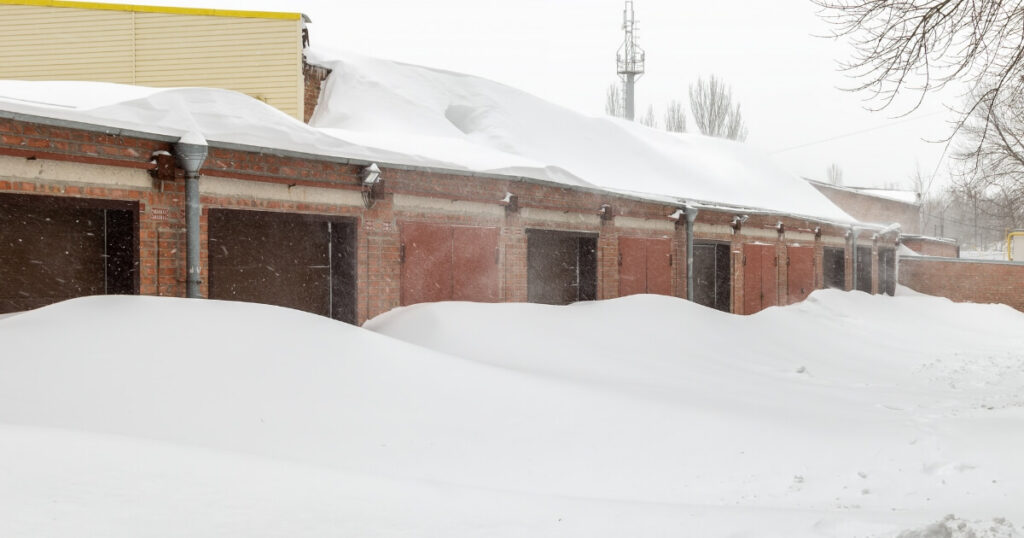As a homeowner, dealing with winter can be a huge task. Wisconsin winters are known to be cold, snowy, and icy. Natural weather problems like ice and snow can cause significant damage to your overhead garage door and other exterior finishings on your home.
Some of the most common winter damages homeowners encounter with their garage doors are:
- Broken Springs
- Frozen Garage Doors
- Water Damage
- Cracked Plastic
How Does Winter Weather Cause Damage?
Freezing:
It’s annoying to have frozen doors, especially if you have somewhere to be. Your garage door’s bottom can quickly become clogged with water and snow, which can then freeze. You run the danger of breaking the hardware if you try to pull or push on your garage door. When water freezes, it expands, which can cause damage to your garage door. If your garage door has small cracks or gaps, water can seep in and freeze, causing the gaps to widen.
When your garage door freezes, try scraping the ice off of it, using hot water, or using a small space heater to melt the ice. Sweep snow, ice, and water away from the base of your garage door to prevent it from freezing.
Water Damage:
To avoid water damage in your garage during the winter, proper insulation and hardware are crucial. Due to wood’s propensity to swell in the winter, homeowners with wooden doors are particularly affected by this typical problem. Your doors will begin fitting securely into the frame as moisture expands the wood. As a result of the friction, the hardware will deteriorate over time, possibly leading to a jammed door.
Spring Damage:
The springs on your garage door help it to open and close smoothly. Metal springs can lose some of their strength in the winter due to the cold and ice. When there is snow or ice on your garage door, the weight of the door can put extra strain on the springs, which can cause them to break.
Before winter arrives, it is advised that you check and test your springs. You may check the condition of your garage springs by lifting the door and then letting go. If the door stays in place without moving, the springs are sound. By installing a safety cable, you may guard against damaged springs, avert mishaps, and harm your property.
Bent Tracks & Lubrication Issues:
The tracks that your garage door slides on can become bent if there is too much snow or ice on the door. This can cause the door to become misaligned and may prevent it from opening or closing properly. If your door gets stuck at certain areas, then you may have lubrication issues. As the temperature drops throughout the winter, this lubricant may harden and even thicken. Moreover, the colder temperatures may result in an uneven distribution of lubricant along the track. Your garage door will start to move freely and smoothly once you properly reapply the lubricant.
Damage to Door Panels:
During the winter, garage doors made of plastic or vinyl may become compromised. When it is below zero degrees, certain materials are prone to cracking. You might think about replacing your garage door with one made for colder areas depending on the extent and frequency of the cracks. Furthermore, over time, the rubber seal that shields your garage from water, insects, and filth may become brittle. Thankfully, weatherproofing a garage is a quick and easy process that requires the addition or replacement of rubber stripping around the sides and under the garage door.
Motor Damage:
If your garage door is equipped with an automatic opener, the motor can be damaged if it is forced to work too hard to lift the door when it is frozen shut. Sometimes, a component of the lifting mechanism rather than the door itself is the issue. Doing the manual lift test will tell you whether there is likely a problem if the door moves up and down without any problems. It might specifically be the motor that drives that mechanism.
Avoid attempting to repair a damaged motor on your own because you risk making things worse. It could have a number of issues, and motors are complicated for someone who isn’t familiar with them. You’ll need to contact an expert to fix this problem.
Consider Professional Repair Services
To prevent damage to your overhead garage door from ice, water, and snow, it is important to keep the door clean and free of any debris that may cause it to become stuck. Additionally, make sure to regularly lubricate the moving parts of your garage door to ensure that it opens and closes smoothly. If you live in an area with heavy snowfall, consider installing a garage door with a higher R-value insulation rating to prevent the door from becoming too cold and freezing shut.
If some of these fixes sound beyond your expertise, and you don’t want to damage your garage door any further, then it is time to consider hiring a professional overhead door repair service. Here at Able-Luebke Overhead Door, we believe in quality service that you can rely on, no matter the weather! Contact us today to receive a quote!

